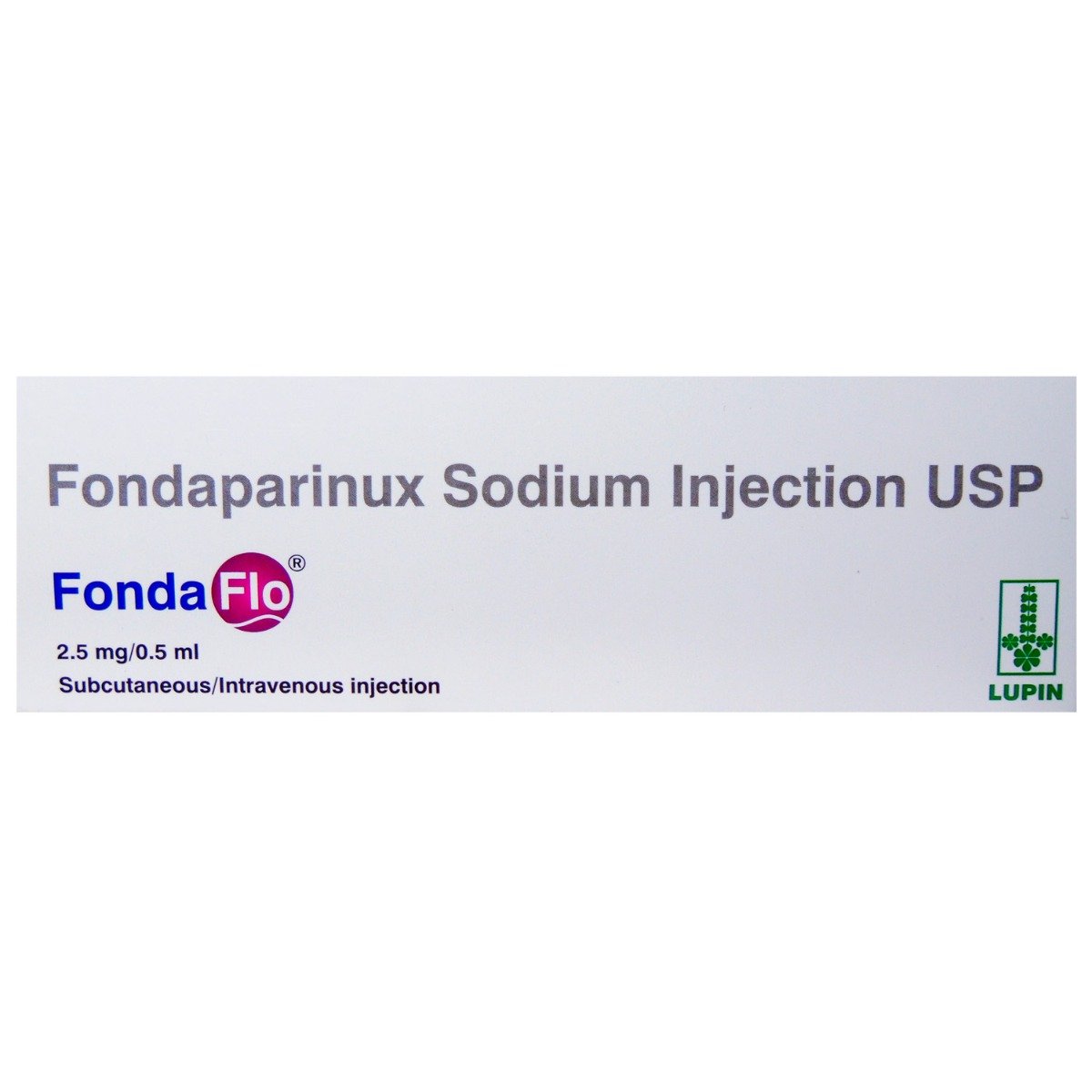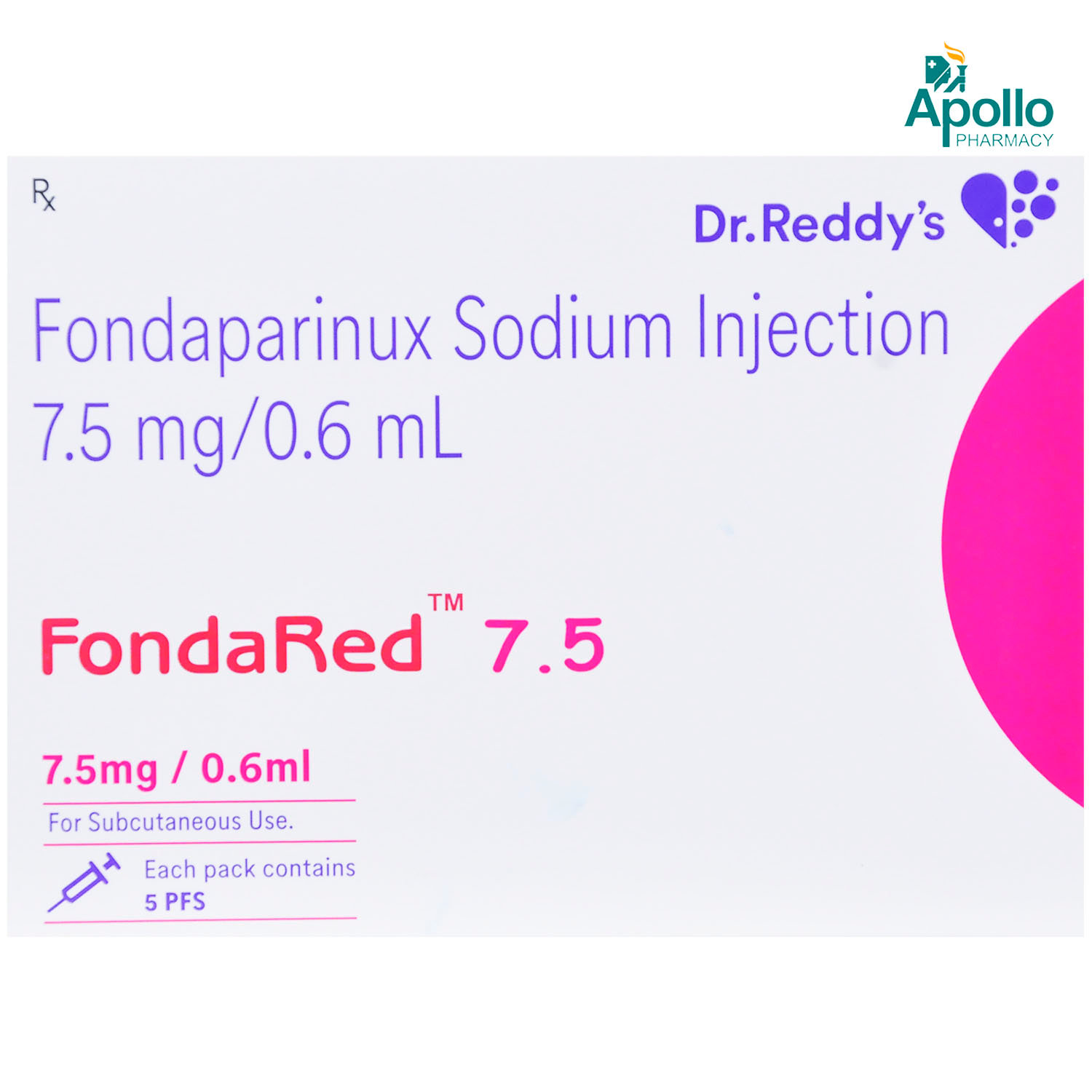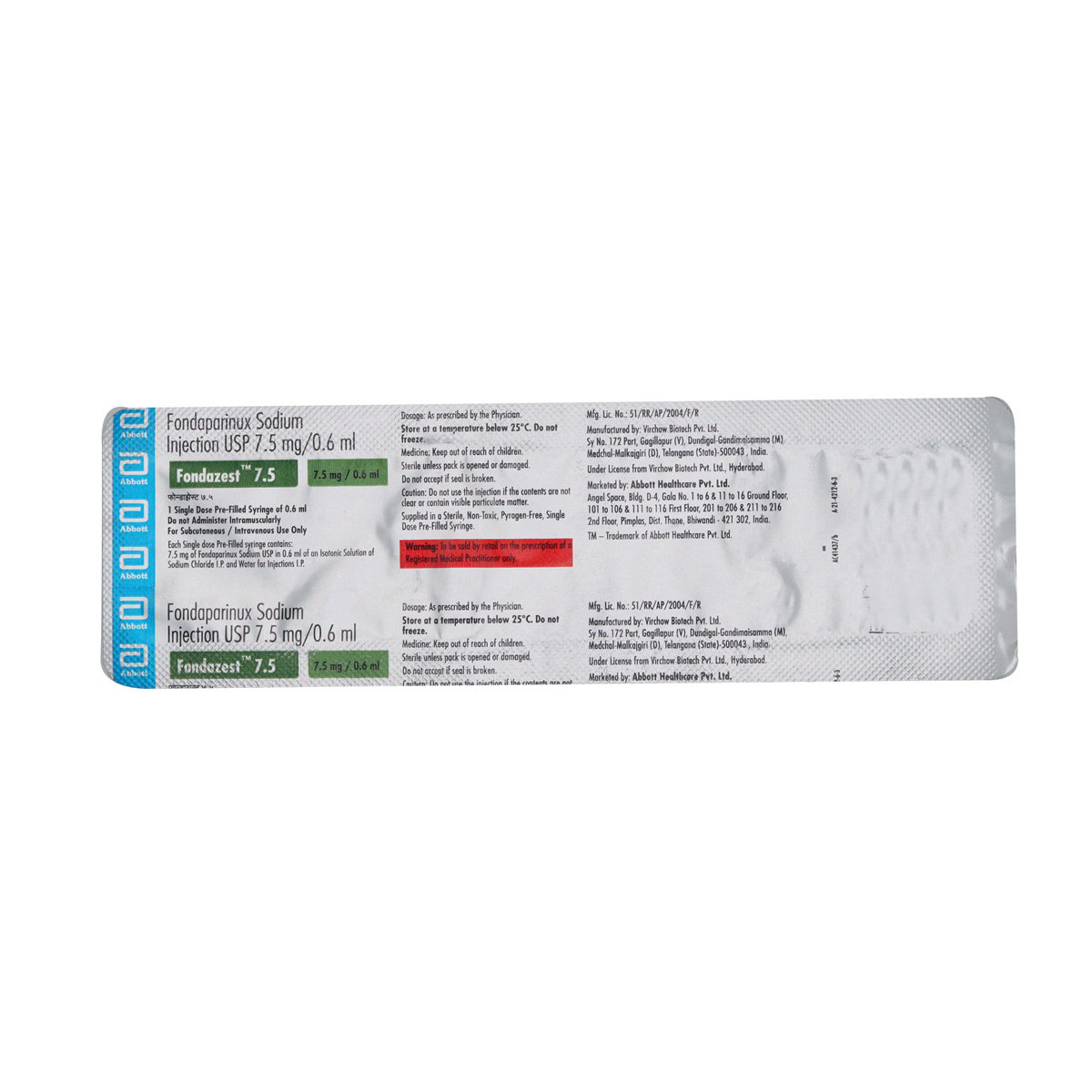Fondaparinux Sodium
About Fondaparinux Sodium
Fondaparinux Sodium belongs to a class of drugs called anticoagulants (blood thinner) primarily used to prevent/treat deep vein thrombosis (blood clots in leg veins), pulmonary embolism (blood clots in the lung), heart attack, and severe angina. It also reduces the risk of blood clots after orthopedic (such as hip or knee surgery), or abdominal surgery. Fondaparinux Sodium prevents blood clot formation during and shortly after restricted movement because of an acute illness. Deep vein thrombosis is a medical condition in which blood clots form in deep veins, usually in the legs. Pulmonary embolism is a condition in which a blood clot blocks the arteries in the lungs.
Fondaparinux Sodium contains ‘Fondaparinux sodium’ that works by inhibiting the action of clotting factors (a natural substance in the blood that causes clotting). Thereby preventing the conversion of fibrinogen to fibrin (a protein that binds platelets together and forms a clot) and helping prevent blood clot formation. It eases blood flow through the veins, making it less likely to develop a severe blood clot.
Fondaparinux Sodium will be administered by a trained healthcare professional; hence do not self-administer. Some people may experience unusual bleeding, anemia (low number of red blood cells), bruising or swelling. Most of these side effects of Fondaparinux Sodium do not require medical attention and gradually resolve over time. However, if the side effects persist or worsen, please consult your doctor.
If you are pregnant or breastfeeding, it is advised to consult a doctor before using Fondaparinux Sodium. Fondaparinux Sodium is not recommended for children below 17 years of age. Fondaparinux Sodium should be used with caution in the elderly above 60, as they may be at high risk of bleeding. If you have a stomach ulcer, kidney or liver problems, high blood pressure, or bleeding problems, inform your doctor before receiving Fondaparinux Sodium. If you are about to undergo surgery, inform your doctor about the treatment with Fondaparinux Sodium. Keep your doctor informed about your health condition and medications to rule out any interactions.
Uses of Fondaparinux Sodium
Medicinal Benefits
Fondaparinux Sodium belongs to a class of drugs known as anticoagulants or blood thinners. Fondaparinux Sodium contains ‘Fondaparinux sodium’ used to prevent deep vein thrombosis (blood clot in the blood vessels of legs) and pulmonary embolism (blood clot in the blood vessels lungs). It also reduces the risk of blood clots during orthopedic (such as hip or knee surgery), abdominal surgery, or restricted movement because of an acute illness. Fondaparinux Sodium works by stopping the action of clotting factor Xa (a natural substance in the blood that causes clotting). This inhibits fibrin production (a protein that binds platelets together and forms a clot), preventing blood clot formation. Fondaparinux Sodium is also used to treat certain types of heart attack and chest pain called unstable angina.
Directions for Use
- Fondaparinux Sodium is usually recommended to be injected once a day. However, follow your doctor's instructions regarding dosage and timing of Fondaparinux Sodium for better results.
- Fondaparinux Sodium will be administered through the subcutaneous (just under the skin) route in the lower stomach area by a healthcare professional, or caregiver, or patients may be trained to self-administer the injection at home.
- Do not use the syringe/needle more than once.
Storage
Side Effects of Fondaparinux Sodium
- Bleeding
- Anaemia (low number of red blood cells)
- Bruising
- Swelling
Drug Warnings
Do not receive Fondaparinux Sodium if you are allergic to any of the contents; if you are bleeding excessively, have a bacterial heart infection, or have very severe kidney disease. If you are pregnant or breastfeeding, it is advised to consult a doctor before using Fondaparinux Sodium. Fondaparinux Sodium is not recommended for children as safety and effectiveness have not been established. Fondaparinux Sodium should be used with caution in the elderly above 65, as they may be at high risk of bleeding. If you are about to undergo any surgery, inform your doctor that you are receiving Fondaparinux Sodium. If you notice bleeding gums, blood in urine, coughing up blood or vomit that looks like coffee grounds, pain, swelling, dizziness, weakness, unusual bruising, nose bleeds, abnormal vaginal bleeding or heavy menstrual periods, bloody or tarry stools, please consult a doctor immediately. Avoid alcohol consumption during treatment with Fondaparinux Sodium as it may increase the risk of stomach bleeding. Inform your doctor before receiving Fondaparinux Sodium if you have a stomach ulcer, kidney or liver problems, high blood pressure, bleeding problems, are 75 years or older, or weigh less than 50kg. Do not discontinue using Fondaparinux Sodium without consulting your doctor, as this may increase your chances of having another heart attack or stroke.
Drug Interactions
Drug-Drug Interactions: Fondaparinux Sodium may have interaction with a pain killer (aspirin, celecoxib), or an anticoagulant (heparin).
Drug-Food Interactions: Avoid alcohol intake as it may increase the risk of bleeding.
Drug-Disease Interactions: If you have diabetes, high blood pressure, congestive heart failure, blood cell disorder (low platelets or low red blood cells), bleeding in the stomach or intestines, kidney/liver problems, bacterial heart infection, bleeding problems, stomach ulcer, inform your doctor before receiving Fondaparinux Sodium.
Drug-Drug Interactions Checker List:
Safety Advice

Alcohol
unsafeYou are recommended to avoid consuming alcohol with Fondaparinux Sodium as it may increase the risk of bleeding.

Pregnancy
cautionPlease inform your doctor if you are pregnant or planning pregnancy. Your doctor will prescribe only if it is clearly necessary.

Breast Feeding
cautionBreastfeeding is not recommended during treatment with Fondaparinux Sodium. If you are a nursing mother, inform your doctor before receiving this injection.

Driving
cautionIt is unknown if Fondaparinux Sodium affects your ability to drive or operate machinery. Therefore, drive or operate machinery only if you are alert.

Liver
cautionFondaparinux Sodium should be used with caution, especially if you have a history of liver diseases. Your doctor may adjust the dose if required based on your condition.

Kidney
cautionFondaparinux Sodium should be administered with caution if you have a history of kidney diseases. Your doctor may adjust the dose if required based on your condition. This medicine is not recommended for patients with severe kidney disease.

Children
cautionFondaparinux Sodium is not recommended for children below 17 years of age as safety and effectiveness have not been established.
Habit Forming
Diet & Lifestyle Advise
- Do not make any changes in your diet without first talking to your doctor.
- Avoid vitamin K-rich foods such as coriander, cabbage, spinach, broccoli, collard greens, kale (leaf cabbage), black liquorice, turnip greens, avocados, and brussels sprouts as they may decrease the effectiveness of Fondaparinux Sodium.
- Avoid cranberry juice, grapefruit juice, noni juice, pomegranate juice and green tea as they may interact with Fondaparinux Sodium and lead to unwanted side effects.
- Do regular exercise as it helps to dissolve blood clots, especially in obese people.
- Avoid consumption of alcohol as it may increase the risk of bleeding.
Special Advise
- To analyze your blood clotting time, regular tests such as platelet count, factor V assay, fibrinogen level test, prothrombin time test (PT or PT-INR) and INR (International Normalized Ratio) are advised.
Patients Concern
Disease/Condition Glossary
Blood clot: A blood clot is a clump of blood that has changed from a liquid to a gel-like or semisolid state. Blood clots are formed to stop bleeding that occurs due to tissue injury. Though blood clots help stop bleeding, they may be harmful when abnormally formed within blood vessels as they block blood vessels, inhibit blood flow to essential organs such as the brain, heart or lungs, and result in severe conditions. The common risk factors for blood clots are obesity, smoking, cancer, family history of blood clots, age over 65, and certain birth control pills or pregnancy.
Deep vein thrombosis: Deep vein thrombosis (blood clots in the legs) is a medical condition in which blood clots form in deep veins, usually in the legs. The symptoms include leg pain or swelling.
Pulmonary embolism: Pulmonary embolism (blood clots in the lung) is a blockage in the lung arteries. It is caused by blood clots that travel from the legs or other body parts. The symptoms of pulmonary embolism include chest pain, cough, and shortness of breath.
FAQs
Fondaparinux Sodium belongs to a class of drugs called anticoagulants (blood thinner) primarily used to prevent/treat deep vein thrombosis (blood clots in leg veins), pulmonary embolism (blood clots in the lung), heart attack, and severe angina. It also reduces the risk of blood clots after orthopedic (such as hip or knee surgery), or abdominal surgery. Fondaparinux Sodium prevents blood clot formation during and shortly after restricted movement because of an acute illness.
Fondaparinux Sodium stops the action of clotting factors. This prevents the formation of unwanted blood clots (thrombosis) in the blood vessels.
If you have diabetes, inform your doctor before receiving Fondaparinux Sodium. Fondaparinux Sodium should be used with caution in diabetic patients as they may be at increased risk of bleeding. Regular blood tests are advised to monitor blood clotting time while receiving Fondaparinux Sodium.
You are not recommended to take aspirin with Fondaparinux Sodium as co-administration of these two medicines may increase the risk of haemorrhage. However, please consult a doctor immediately if you notice blood in urine or stools, dizziness, unusual bleeding or bruising, vomiting, weakness or headache. If you are supposed to use these medicines together, you are advised to contact your doctor so that the dose may be adjusted appropriately.
Yes, Fondaparinux Sodium may increase the risk of bleeding, and the effects of Fondaparinux Sodium may last for four days even after discontinuation. Always be careful while doing activities that may cause injury or bleeding. Please inform your doctor immediately if you notice purple spots on the skin, unusual bruising, blood in urine, black tarry stools, or unusual bleeding from the gums or nose.
Tests such as platelet count, factor V assay, fibrinogen level test, prothrombin time test (PT or PT-INR), and the INR (international normalized ratio) are used to determine blood clotting time.
You are usually not advised to have a tattoo or body piercing while receiving Fondaparinux Sodium as it may increase the risk of bleeding and infection. If you still wish to proceed further, contact your doctor to adjust the dose, or any antibiotics may be prescribed. Let the piercer or tattooist know in advance that you are on treatment with a blood thinner.
Please consult your doctor if you are due to undergo any surgery. The doctor might stop the administration of Fondaparinux Sodium a few days before surgery as it can cause an increased risk of bleeding during surgery.
No, you should not take Fondaparinux Sodium with OTC painkillers as it may cause interactions. Consult the doctor if you have any odd pain.
No, you should not self-administer Fondaparinux Sodium because some people may experience anemia (low number of red blood cells), unusual bleeding, bruising or swelling. It should be administered by the doctor or nurse to prevent adverse effects.
Excessive menstrual bleeding while taking Fondaparinux Sodium may be concerning, as this medication increases the risk of bleeding due to its anticoagulant effect. It’s important to consult the doctor if you have excessive bleeding, as they may need to evaluate your condition and adjust your treatment to ensure your safety.
The long-term use of Fondaparinux Sodium will be based on your specific clotting disorder and risk factors. The doctor will assess the risks and benefits and determine how long the treatment should be continued. Consult the doctor if you have any concerns.
Yes, Fondaparinux Sodium may increase the risk of bleeding, with its effects lasting up to four days after discontinuing the medication. Take extra caution during activities that might cause injury or bleeding.
The side effects of Fondaparinux Sodium include anaemia (low number of red blood cells), unusual bleeding, bruising or swelling. Consult the doctor if any of these symptoms persist or worsen.





